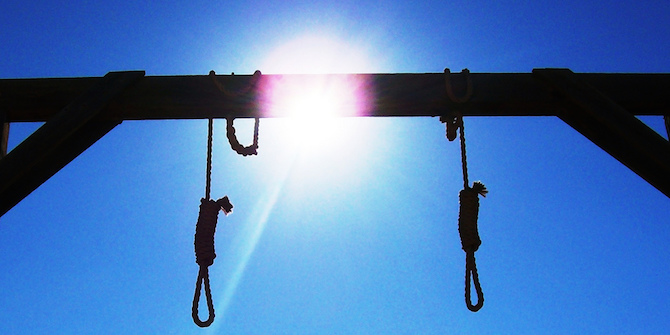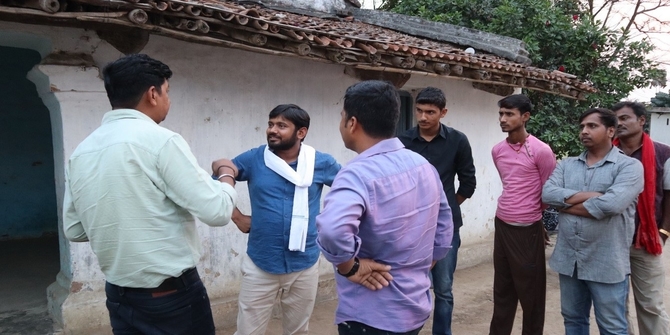 The Punjab Protection of Women Against Violence Act, which came into force in February this year, marks a progressive shift in domestic violence legislation, but it has also prompted a backlash from powerful religious political parties. Menaal Munshey writes that for the Act to be effective, the government must wholeheartedly back the liberal ideology it has espoused and avoid allowing the religious right to dominate the political narrative.
The Punjab Protection of Women Against Violence Act, which came into force in February this year, marks a progressive shift in domestic violence legislation, but it has also prompted a backlash from powerful religious political parties. Menaal Munshey writes that for the Act to be effective, the government must wholeheartedly back the liberal ideology it has espoused and avoid allowing the religious right to dominate the political narrative.
The Punjab Protection of Women Against Violence Act was passed unanimously by the Punjab Assembly, and came into force in February 2016. The Act specifically aims to protect women from domestic violence, and more widely to “create an enabling environment to encourage and facilitate women freely to play their desired role in society”. The law comes as part of women empowerment measures being taken by the Punjab government such as extended, paid maternity leave. It is recognition of the fact that violence against women is rampant in Pakistan, and particularly in Punjab. In 2013, more than 5,800 cases of violence against women were reported in Punjab, which represents 74% of the national average. For the law to reverse this trend, an ideological, political and societal effort is needed.
A socio-legal critique
“Domestic violence” according to Section 2(h), is defined as “violence committed by the defendant with whom the aggrieved is living or has lived in a house when they are related to each other by consanguinity, marriage or adoption”. Other types of relationships, such as in-laws, are conspicuously absent here. Under Section 2(r) violence itself is “any offence committed against a woman including abetment of an offence, domestic violence, emotional, psychological and verbal abuse, economic abuse, stalking or a cybercrime”.
What makes the law unprecedented in Pakistan is its innovative enforcement mechanisms: a universal toll-free dial-in number for complainants, women protection committees at the district level consisting of government officers and members of civil society, protection centres and shelter homes with staff who are able to provide medical, psychological and legal assistance, and judicial protective orders which make use of GPS ankle and wrist trackers to track the movement of defendants. The law provides for a 120 day window to set up these mechanisms, although so far limited progress has been made. These promising mechanisms empower women by giving them agency to become complaint takers and enforcers of a law that affects them the most. These women protection committees could be a robust example of public-private collaboration with the added external oversight of independent members of civil society, and may prove to be an exemplary instance of citizens’ solidarity for a common cause. To be effective, the law requires the creation of a vast institutional infrastructure, and detailed rules to operationalize the Act and create uniform standards across districts of Punjab.
Although the law is progressive in scope and indicates an egalitarian shift, it has multiple shortfalls. Unlike progressive domestic violence legislation in Sindh and Balochistan, the legislation doesn’t criminalise domestic violence. Instead it provides civil remedies, rather than criminal sanctions of arrest, imprisonment and/or a fine. These require a violation of the initial civil orders. As a result, a case cannot be registered under the act, as it is a civil matter, which also bears on the burden of proof. The law will operate when aggrieved persons submit a complaint to a Women’s Protection Officer to obtain a protection, residence or a monetary order through a relevant court within the stipulated time period. Relief, thus, is not immediate, but rather deferred. The stringent timeline places an onus on already overburdened courts, without providing for increased judicial resources. In addition, although the law appears to take progressive steps, it remains silent on key issues such as custody of children, and the issue of dowry.
An ideological battle
The government boldly passed the law in a liberal show of defiance, and Sharif’s progressive steps have faced increasing resistance by the religious parties, who command immense street power in Pakistan. The right wing contends that this is a violation of the Constitution and Sharia law as it is an invasion of the privacy of the home, and will lead to an increase in divorces, and a destruction of family values. Spearheaded by the religious parties, the law has been challenged at the Federal Shariat Court, which has the power to examine laws on the basis of Islam, where the petitioner has argued that it is repugnant to Islam. The Council of Islamic Ideology has also ruled the law as being “un-Islamic”, calling it an “attempt to make Pakistan a western colony again”. The Council of Islamic Ideology is an advisory body which is tasked with making recommendations on laws and functions of the government to ensure they are not contrary to Islam. However, despite it’s advisory capacity, it holds considerable influence with legislators.
The Sharifs have traditionally aligned with the religious right, and are currently in Government with these religious parties at the federal level, thus making this a particularly politically sensitive issue as it threatens the composition of the federal government and therefore Sharif’s power. Cognisant of this, the government has formed a committee with the religious parties to consider amendments to the law. So far, none have been proposed. If amendments are offered the Punjab Government is under no obligation to accept these, given their overwhelming majority in the Punjab Assembly. However, they appear to be superficially pandering to the religious right to avoid mass protests and an exodus of the religious parties from the political alliance in the federal government. Although potentially politically expedient, this non-confrontational approach threatens the writ of the state. The government cannot afford to pay the political price of a retreat, especially after the religious parties displayed their strength at Mumtaz Qadri’s funeral which was attended by over 90,000 people in Islamabad who then stormed and staged a sit-in at Constitution Avenue for 3 days while the government appeared to be a spectator.
The Act essentially represents a battle of competing ideologies in Pakistan. For the law to assume its power, it requires a change in mindset. For this, the government must wholeheartedly back the liberal ideology it has espoused through the Act, rather than allow the religious rightwing to dominate the political narrative. If this does not occur, the Act will face the same fate as other progressive pro-women laws in Pakistan that have so far been largely ineffective due to structural factors such as the lack of independence of women, a weak criminal justice system, and a lack of societal support for women. For this law to have a tangible impact on women’s lives, strong political will backed up by institutional changes, and complimentary large-scale societal efforts are needed. In an atmosphere dominated by fear and intolerance, civil society must come together to educate law enforcers and the wider public on methods to apply the law, and build awareness of its compatibility with Islamic values. Ultimately, attitudes towards women need to change for human rights to be enforced both within legislation, and in society.
The Punjab Women’s Protection Act has prompted a national debate and highlighted the battle of competing ideologies that exists in Pakistan today. It is time for the government and larger society to actively promote a liberal, progressive ideology in order to make a positive qualitative and quantitative impact on human rights in Pakistan.
Cover image credit: UN Women Pakistan/Atif Khan
Note: This article gives the views of the author, and not the position of the South Asia @ LSE blog, nor of the London School of Economics. Please read our comments policy before posting.
About the Author
 Menaal Munshey is a Junior Researcher with the UNU Centre for Policy Research. She conducts research on terrorism, organised crime, and peacekeeping. Her interests lie in human rights protection, violence prevention, and public law.
Menaal Munshey is a Junior Researcher with the UNU Centre for Policy Research. She conducts research on terrorism, organised crime, and peacekeeping. Her interests lie in human rights protection, violence prevention, and public law.
She holds an MPhil in Criminological Research from the University of Cambridge where her research focused on blasphemy, law and violence in Pakistan, with fieldwork conducted in Sindh. She previously read law at the University of Warwick, with an Erasmus year at Eötvös Loránd University, Budapest. She is a qualified barrister in England and Wales, and has been the recipient of the Sir Albion Richardson scholarship at Gray’s Inn.
Menaal is also a lawyer in Pakistan and acts as the non-resident Senior Research Coordinator at the Legal Aid Office in Karachi.








1 Comments